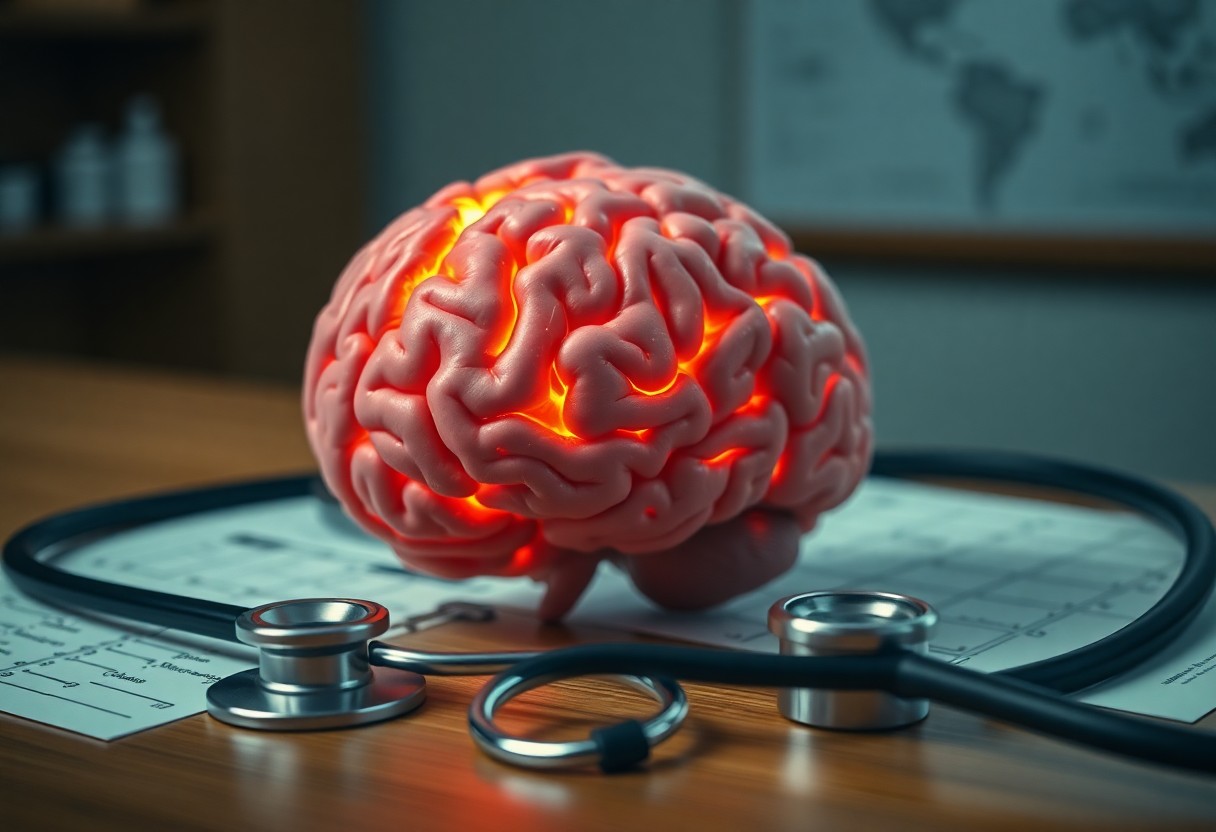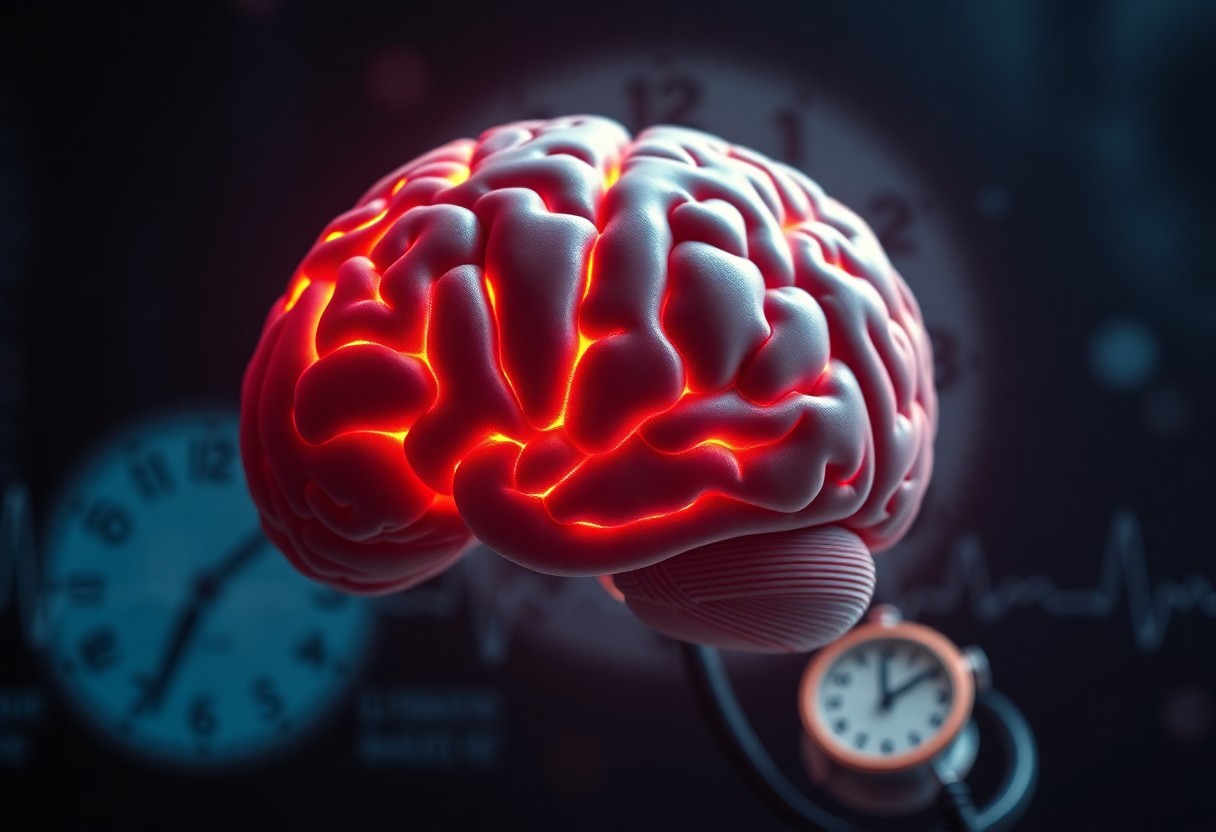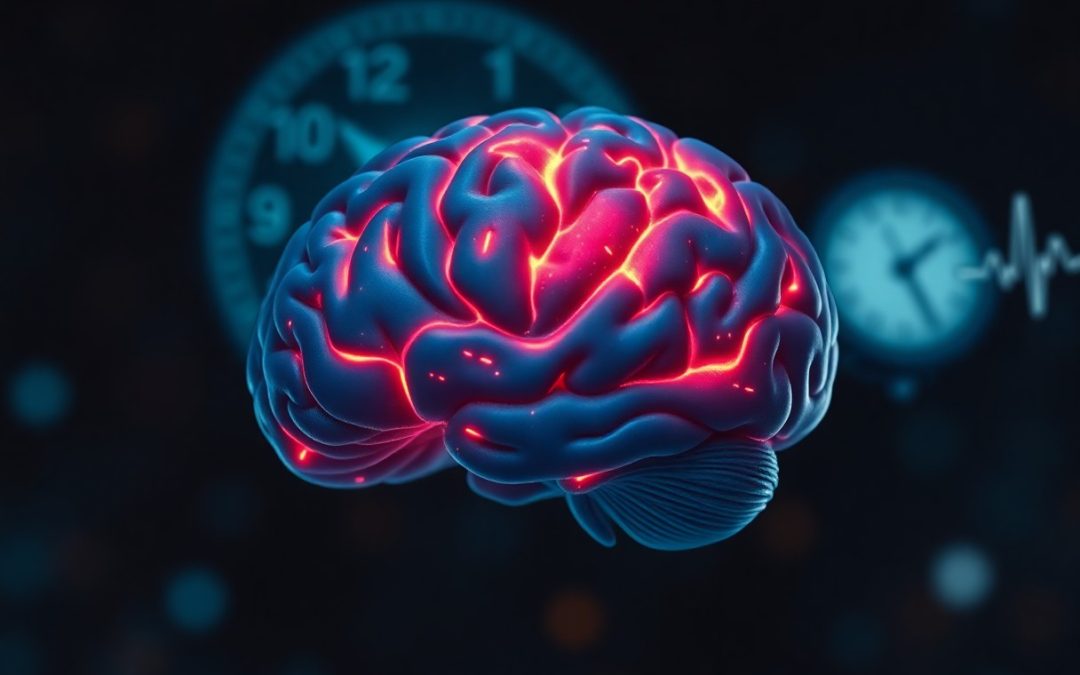Just because the symptoms of a mini-stroke fade quickly doesn’t mean there’s no lasting impact on your brain. A transient ischemic attack (TIA) can lead to cognitive decline at a similar rate as a full stroke, affecting your memory and overall brain function. Research suggests that TIA is an independent risk factor for long-term impairment, making early detection and treatment necessary. Managing your risk factors, such as high blood pressure and poor health, can help protect your brain from further damage. Taking proactive steps now can support your cognitive function in the years ahead.

Understanding Mini-Strokes (TIA)
For many people, a transient ischemic attack (TIA), or mini-stroke, may seem harmless since its symptoms disappear quickly. However, research indicates that even these temporary events can lead to long-term cognitive decline, similar to a regular stroke. A TIA occurs when blood flow to part of your brain is briefly interrupted, causing brain cells to stop functioning. Without intervention, a TIA can signal a higher risk for future strokes and cognitive issues. Experts stress that aggressive treatment and managing risk factors are necessary to protect your brain and overall health.
Definition and Blood Flow Impact
Against common belief, a TIA is not a harmless event but rather a warning sign that your brain may be at risk. It occurs due to a short-lived lack of blood flow, depriving brain cells of oxygen and nutrients. While the blockage clears quickly, the short supply of blood can still impact brain function and increase the likelihood of long-term problems. Studies show that people who have had a TIA experience cognitive decline at the same rate as those who suffer a full stroke. Early intervention is necessary to minimize future health risks.
Distinction from Regular Strokes
The primary distinction between a TIA and a regular stroke is the duration of the blockage and the visible damage. A regular stroke leads to prolonged lack of blood flow, often resulting in irreversible brain damage. In contrast, a TIA resolves quickly, typically within minutes to hours, leaving no immediate noticeable harm on imaging. However, despite the absence of visible damage, studies confirm that TIAs still contribute to cognitive decline, particularly in memory recall. If you’ve had a TIA, taking preventive measures can help safeguard your brain and health.
Flow of blood to your brain is critical for maintaining proper cognitive and physical functions. When blocked, even temporarily, brain cells struggle to perform, increasing the risk of future concerns. Researchers tracking over 16,000 people through the REGARDS study discovered that those with a history of TIA showed significant declines in memory over 14 years. This proves that while a TIA may not leave immediate, visible harm, its long-term effects should not be ignored. Managing risk factors and seeking proper treatment after a TIA can make a major difference in your cognitive and overall health.
Research Findings on Cognitive Impact
Any transient ischemic attack (TIA), often referred to as a mini-stroke, can contribute to long-term cognitive decline, even though symptoms may disappear quickly. Researchers found that individuals who experience a TIA show cognitive decline at the same rate as those who have had a full stroke. This contradicts previous assumptions that TIA does not result in lasting brain damage. Experts emphasize that more aggressive treatment is necessary to reduce cognitive risks, highlighting the need for early intervention and prevention strategies.
Study Overview and Methodology
Methodology involved analyzing data from over 16,000 adults in the REGARDS study to assess cognitive impact following a first-time TIA. Participants, aged 45 and older, had no prior history of stroke or TIA at enrollment. Researchers used brain imaging to confirm diagnoses and tracked cognitive changes through telephone interviews over an average period of 14 years. Comparisons were made between those who had a TIA, a stroke, and a control group with no history of either condition, revealing significant cognitive differences over time.
Memory and Verbal Function Effects
An important finding was that cognitive decline in TIA patients was predominantly linked to memory rather than verbal skills. Researchers noted that both immediate and delayed memory recall were significantly affected, whereas verbal fluency remained relatively stable. These results suggest that the impact of TIA on brain function is more pronounced in areas related to memory retention and retrieval.
Overview of additional results shows that TIA should not be considered a harmless event. While stroke is widely known to cause detectable brain damage on imaging, this study confirms that TIA can lead to similar cognitive deterioration over time. Experts stress that managing risk factors such as high blood pressure and maintaining overall health can help reduce the likelihood of long-term complications, including cognitive decline. Addressing these concerns early may improve outcomes for individuals who have experienced a TIA.
Risk Factors and Prevention
You can lower your risk of a mini-stroke by managing key factors that contribute to its occurrence. Some risk factors are within your control, while others are not. Preventive measures, including lifestyle changes and medical management, can significantly reduce the likelihood of experiencing a mini-stroke.
- Monitor your blood pressure regularly to keep it under control.
- Adopt a heart-healthy diet and stay physically active.
- Manage underlying conditions like diabetes and high cholesterol.
This proactive approach can protect your health and lower the risk of future cerebrovascular events.
Common Risk Factors
Between genetic predisposition and lifestyle choices, several factors increase your chances of experiencing a mini-stroke. While you can’t change some risks, others can be addressed through proper management.
- High blood pressure is the leading cause of TIAs.
- Smoking and excessive alcohol consumption raise stroke risk.
- Uncontrolled diabetes and high cholesterol contribute to vascular issues.
This means actively managing your health can make a difference in preventing long-term complications.
Preventive Measures
Around 80% of mini-strokes and strokes are preventable with appropriate actions. Lifestyle changes combined with regular medical check-ups enhance your chances of avoiding a transient ischemic attack. This includes blood pressure control, maintaining an active lifestyle, and avoiding tobacco products. If you have risk factors, prioritizing a heart-conscious lifestyle can greatly improve your overall health.
At every stage of life, taking preventive steps can reduce your likelihood of experiencing a mini-stroke. Staying active, maintaining a nutritious diet, and managing medical conditions play vital roles in decreasing stroke risk. Annual physicals help monitor changes in risk factors, and early intervention can be beneficial. By proactively addressing your health, you create a stronger defense against future cerebrovascular events.
Symptoms Recognition
Despite disappearing within minutes or hours, the symptoms of a mini-stroke, or transient ischemic attack (TIA), should not be ignored. A TIA causes a temporary lack of blood flow to your brain, leading to neurological symptoms that may mimic a full stroke. These warning signs indicate potential underlying risks that could lead to more severe stroke events in the future. Even if you feel fine shortly after experiencing symptoms, seeking immediate medical attention can help identify and manage risk factors before lasting damage occurs.
Common Warning Signs
Behind every mini-stroke are warning signs that signal an urgent need for action. You may experience sudden numbness or weakness, especially on one side of your body, along with vision disturbances, difficulty speaking, or loss of coordination. Some people report a brief but intense confusion or dizziness that seems to pass quickly. Because these symptoms resolve on their own, they are sometimes mistaken for minor issues, but they serve as early indicators of future stroke risk.
Duration and Characteristics
Any transient ischemic attack is defined by its temporary nature, typically lasting from a few minutes to an hour. Unlike a full stroke, TIAs do not cause visible brain damage on imaging, yet research shows that they still contribute to cognitive decline, particularly affecting memory. Scientists analyzing more than 16,000 participants in the REGARDS study found that those who had experienced a TIA saw declines in both immediate and delayed memory recall.
Understanding the characteristics of a mini-stroke underscores its impact on long-term brain function. While verbal fluency may remain unchanged, studies confirm that memory-related cognitive changes occur at the same rate as in those who suffer a full stroke. Even though the effects might not seem permanent, your brain is still affected, highlighting the need for proactive treatment and lifestyle changes to reduce your overall risk.

Diagnosis and Medical Assessment
All suspected cases of a mini-stroke require a thorough medical evaluation to assess potential brain damage and risk of future events. Since symptoms often disappear quickly, you may feel fine, but cognitive decline can still occur over time. Experts emphasize the need for early medical assessment to determine your treatment options and prevention strategies. A detailed review of your medical history, blood pressure levels, and other risk factors can help identify underlying conditions that may contribute to another episode. Seeking immediate care ensures you receive the best possible intervention to safeguard your [health](https://bit.ly/PerKETODiel).
Diagnostic Procedures
Behind every diagnosis of a mini-stroke is a series of tests designed to identify the cause and potential impact on your brain. Doctors often begin with a neurological exam, assessing reflexes, coordination, and muscle strength. Blood tests check for high cholesterol and other stroke-related risk factors. A computer-assisted telephone interview similar to the one used in research helps evaluate cognitive function over time. By undergoing these necessary assessments, you can gain a better understanding of your condition and receive appropriate treatment to reduce the risk of future strokes.
Brain Imaging Requirements
On top of clinical exams, brain imaging plays a significant role in diagnosing a mini-stroke. Advanced imaging, such as MRI or CT scans, helps determine if blood flow was temporarily disrupted and whether any structural damage has occurred. These scans also rule out other potential causes of symptoms, ensuring that your treatment plan is tailored to your specific needs. Without imaging, it is difficult to confirm the presence of TIA or a full-blown stroke.
In addition to confirming a mini-stroke, imaging results can identify early signs of cognitive decline. Researchers analyzing data from more than 16,000 people found that declines in memory recall were common in individuals who had a TIA. Brain scans help track these changes over time, ensuring that you receive proactive care to maintain cognitive function. Since symptoms of TIA may fade quickly, imaging provides a reliable way to assess the lasting impact on your brain and adjust your [health](https://bit.ly/PerKETODiel) strategy accordingly.
Treatment and Management
Once again, addressing a mini-stroke requires swift action and ongoing care to reduce the risk of future events and cognitive decline. Since transient ischemic attacks (TIAs) share risk factors with strokes, your approach should include lifestyle changes, medication, and regular monitoring. Research highlights that TIA survivors need aggressive treatment to prevent long-term complications, including memory issues. Managing your [health](https://bit.ly/PerKETODiel) by controlling blood pressure and addressing cardiovascular risks can help protect brain function. Consulting a stroke specialist ensures that you receive the right medical guidance and follow-up care to minimize further impact on your cognitive abilities.
Immediate Response Protocol
Management of a TIA begins with immediate medical attention, even if your symptoms disappear quickly. Because TIAs can indicate an increased risk of stroke, emergency evaluation is necessary. Brain imaging helps confirm whether you experienced a TIA, and assessments of your [health](https://bit.ly/PerKETODiel) guide treatment decisions. Doctors may prescribe blood thinners, cholesterol-lowering medications, or blood pressure control measures to address underlying causes. Seeking urgent care ensures a prompt diagnosis and helps in implementing early interventions that lower the likelihood of a more severe cerebrovascular event in the future.
Long-term Management Strategies
For ongoing prevention, focusing on lifestyle adjustments and medical management is key. Research confirms that uncontrolled risk factors contribute to cerebrovascular events, making it imperative to adopt preventive measures. Controlling your blood pressure, staying physically active, and following a [health](https://bit.ly/PerKETODiel)-conscious diet can all support brain function. Medication adherence is also important, as prescribed treatments help prevent complications. Monitoring cognitive function with regular checkups enables early detection of any signs of decline, allowing adjustments to your care plan as needed.
And beyond lifestyle changes, structured medical follow-up further reduces your risks. Regular visits with your doctor ensure that your treatment plan remains effective, and additional tests may be necessary to assess any new developments in your [health](https://bit.ly/PerKETODiel). If you’ve had a TIA, specialists may recommend advanced imaging or neurocognitive testing to track your progress. These strategies, combined with proactive risk management, support long-term brain [health](https://bit.ly/PerKETODiel) and help minimize the likelihood of lasting cognitive effects.
Summing up
As a reminder, a mini-stroke, or transient ischemic attack (TIA), may seem temporary, but it can still lead to long-term cognitive decline. Research shows that TIA affects memory similarly to a full stroke, highlighting the need for aggressive treatment and risk factor management. Monitoring your blood pressure, maintaining a healthy health routine, and seeking medical care if you’ve had a TIA can help reduce the risk of further complications. By taking proactive steps, you can protect your brain function and lower the chances of experiencing more severe cerebrovascular events in the future.


